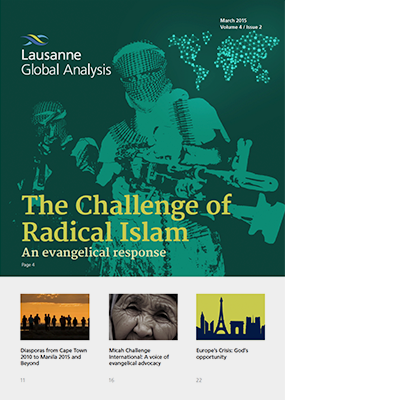Welcome to the March 2015 issue of Lausanne Global Analysis.
Whether you are planning to read the full articles or just the executive summaries, we hope that you find this issue stimulating and useful. Our aim is to deliver strategic and credible analysis, information, and insight so that as an influencer you will be better equipped for the task of global mission. It’s our desire that the analysis of current and future trends and developments will help you and your team make better decisions about the stewardship of all that God has entrusted to your care.
In this issue we feature an evangelical response to the challenge of radical Islam; we address diaspora mission in the run-up to the 24-28 March Global Diaspora Forum; we assess the impact of the Micah Challenge initiative; and we follow-up our article from two issues ago on Europe as a strategic mission field by examining how Europe’s current crisis is God’s opportunity.
‘For many evangelicals, jihadi groups are obscurantist, primitive, and ferocious, embodying all the prejudices associated with the supposed ‘essence’ of Islam’, writes John Azumah (Associate Professor of World Christianity and Islam at Columbia Theological Seminary, Georgia, USA). However, the truth about religious lives is not so simple. Christians have to engage with Muslims in frank and open dialogue on issues such as the tacit support for jihadi groups in the mainstream Muslim world and the blind eye turned to the largely contemptuous and belligerent teaching about non-Muslims in authoritative Islamic texts and popular consciousness. Is it not time for Islamic scholars and leaders to reexamine doctrines that are so easily abused by extremists? However, ‘we must remain watchful and prayerful about the danger of radical Islam radicalizing evangelicals into re-defining our witness and values. The battle is not against flesh and blood but against principalities and powers’, he concludes.
‘The current global phenomenon of diaspora is a God-initiated and God-orchestrated missional moment in contemporary history’, notes Sadiri Joy Tira (Vice President for Diaspora Missions for Advancing Indigenous Missions). The mass redistribution of people has profound implications for missions strategy and has caught the attention of missiologists. Global diasporas and missions were a highlighted topic at the Third Lausanne Congress in Cape Town in 2010. The Global Diaspora Network was organized to broaden the diaspora network and project the diaspora agenda beyond Cape Town. It will convene the Global Diaspora Forum from 24-28 March 2015 in Manila. ‘Diaspora mission is a kairos opportunity. I am thankful that the Lausanne Movement’s embrace of diaspora missiology is stimulating the whole church to take the whole gospel to the whole world, particularly to the diasporas—the scattered peoples’, he concludes.
In 2000, 189 nations agreed to halve extreme poverty by 2015. The UN formulated eight Millennium Development Goals (MDGs) to achieve this. ‘Micah Challenge, birthed by the World Evangelical Alliance and Micah Network, recognized that this was a moment in history of unique potential, when the stated intentions of world leaders echoed something of the mind of the biblical prophets and the teachings of Jesus concerning the poor’, write Joel Edwards (International Director for Micah Challenge) and Geoff Tunnicliffe (Secretary General for World Evangelical Alliance, 2005-2014). What was really new about the Micah experiment was the emphasis on advocacy—calling decision-makers to account to fulfil their promise to achieve the MDGs. The brief story of Micah Challenge suggests that there is a lot to celebrate. For example, extreme poverty has been halved in the last 25 years and millions have been lifted from poverty. ‘However, in seeing the kind of justice, mercy, and love the Bible describes, we still have a long way to go’, they conclude.
Europe faces crises on many different levels—economic, political, social, environmental, and religious. ‘However, today most Europeans hope not for the return of the Lord Jesus, but for the return of economic growth’, writes Jim Memory (lecturer in European Mission at Redcliffe College, Gloucester, UK). Even if it were possible, is economic growth really the hope for Europe? For most of Europe’s history, crisis has been the normal context for the church’s life and mission. If Christians have to adapt to a new context of long-term crisis in Europe, we can do so in the confidence that previous generations of European believers have done so. For the first time in a generation, Europeans are questioning the hope and security that this world offers. It is the moment for churches to regain their confidence in the gospel as the hope for Europe. ‘Europe’s crisis is God’s opportunity’, he concludes.
Please send any questions and comments about this issue to analysis@lausanne.org. The next issue of Lausanne Global Analysis will be released in May.

